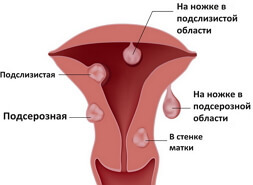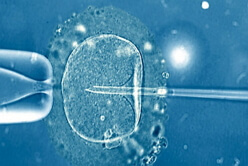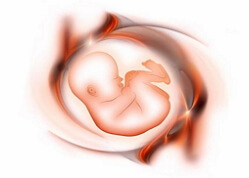Why there are no monthly
 Why is there no monthly ?Under the "delay" of menstruation usually mean the delay of regular menstruation at a normal menstrual rhythm. Also, about the delay of the monthly talk, if the girls who have overcome the 16-year-old line did not have a single menstruation.
Why is there no monthly ?Under the "delay" of menstruation usually mean the delay of regular menstruation at a normal menstrual rhythm. Also, about the delay of the monthly talk, if the girls who have overcome the 16-year-old line did not have a single menstruation.
Among the reasons for the visit to the gynecologist, the absence of a period in the usual period is very common, but not always this delay corresponds with pathology. If the expected menstruation is delayed for several days, and then passes in the usual mode, it is unlikely that its delay is associated with serious causes.
The absence of menstruation and the irregularity of the menstrual cycle are often found in adolescents in the first years after the onset of menstruation and in women before menopause. One of the most popular physiological reasons for the absence of menstruation in women of reproductive age is pregnancy.
It is about the presence of pregnancy in the first place is worth considering if there is no monthly after unprotected sexual intimacy. The most inexpensive and affordable way to learn about the presence of a small pregnancy is an express test, which you can do yourself at home with even the slightest menstrual delay.
Express diagnosis of early pregnancy is based on determining the presence in the urine of chorionic gonadotropin( hCG), the so-called "pregnancy hormone", in the laboratory it is also found in the blood. It should be noted that the presence of a positive result of the urine test for hCG indicates only the pregnancy itself, but can not determine its localization, in the presence of an ectopic pregnancy it will also be more often positive. Only the concentration of chorionic gonadotropin in the blood can indicate the uterine location of pregnancy, which increases as the gestation period increases, and if the fetus is located outside the uterus, the amount of hCG will not correspond to the gestational age.
Why is there no monthly test, and the test is negative, and the woman feels pregnant? The first most obvious reason is a false negative result of express diagnostics or failure to comply with the rules for conducting it. There may be another situation when the test indicates pregnancy, but it really is not. Therefore, in case of any doubts, you should read the rules again and repeat the test in a week.
The list of other physiological reasons for menstrual delay is quite large and includes stresses, physical overwork, colds, hormonal drugs, weight loss and others. If the monthly delayed according to physiological reasons, the cycle is restored independently and does not require medical intervention.
In the postpartum period, the delay in menstruation is due to hormonal changes, and in nursing, there are sometimes no monthly periods.
To understand why there are no long periods, it is necessary to determine when they are the norm, and when they should be referred to as pathological.
Each woman regardless of age, there are individual parameters of the menstrual cycle, but they are always in certain, albeit wide, limits. As a rule, the first menstruation occurs in girls in 11-15 years, in the next 2-3 years a regular menstrual cycle is formed, and by the age of 18 the menstrual function acquires "adult" traits. The nature of the established menstruation usually does not change until the menopause.
For the "norm" regular menstrual cycle is taken with an interval of 21 - 35 days. In 60% of women, the menstrual cycle is 28 days. Most menstrual bleeding lasts no more than a week, and the period of the most active blood loss usually does not exceed 2 to 3 days. Menstruation should not be too abundant. If a woman needs no more than four sanitary napkins a day, the amount of daily lost blood is related to the norm( 40-150 ml).In healthy women, menstrual periods pass without severe pain and severe malaise.
If menstruation is delayed for a short time( no more than seven days), and then passed in the usual rhythm without accompanying negative symptoms, most likely the reasons for the delay are harmless. Violation of the usual rhythm of menstruation for several cycles requires examination and, most likely, adequate therapy.
Delay of menstruation as a symptom accompanies many gynecological ailments: inflammatory diseases, hormonal dysfunction, polycystic ovary syndrome, tumors, endometriosis and others. The regularity of menstrual function is negatively affected by endocrine diseases, especially the pathology of the thyroid gland. If menstrual dysfunction is associated with a disease, in addition to the delay in menstrual dysfunctions, the symptoms of the underlying disease are present.
The absence of monthly primary in teenagers is always associated with a delay in normal puberty, less often it provokes any anatomical defect, endocrine pathology.
To answer the question: "why is there no long period?" Is not always easy. Diagnostic search begins with the most simple activities( interview, gynecological examination) and can end after complex hormonal and instrumental research.
It is not advisable to talk about the treatment of menstrual delay, because in each specific case it is just a symptom and is not treated separately from the underlying disease. Physiological delays of the next menstruation treatment do not require.
Reasons why there is no monthly
The delay of another menstruation is the earliest signal of the body about the pregnancy that has come. As already mentioned above, the first diagnostic measure for delaying the monthly and suspicion of pregnancy is an independent express test( better conducted twice weekly) or an analysis on the hCG in a laboratory.
However, menstrual delay does not always mean the presence of pregnancy. Sometimes, menstrual lag due to colds, physical overwork, stress. Negatively, the menstrual rhythm is affected by excessive fascination with weight control, especially at a young age, when the hormonal function passes through the stage of formation. Often, rapid weight loss with debilitating diets and / or excessive physical exertion leads to hormonal dysfunction and, consequently, to the absence of menstruation. In severe cases( anorexia, bulimia), a significant deficit in weight can provoke a complete loss of menstrual function.
However, menstruation can also start to linger if a woman does not follow her diet and is overweight. As a rule, obesity is a consequence of dysfunction of the endocrine system, which is closely related to the menstrual cycle.
Modern hormonal contraceptives contain few hormones, so often their reception leads to a change in the nature of menstruation. The prolonged effect on the endometrium of small doses of the progestin contained in the COC may change its thickness, namely, decrease. As a result, menstruation becomes unattractive, sometimes smearing, and in a small number of women they stop altogether or come with great delays.
In the first few years after the onset of menstruation, the cycle rarely has permanent normal characteristics. An unstable menstrual cycle with small delays, as a rule, can be present in girls for two or three years, and then independently acquires physiological features. It is believed that by the age of 18, the monthly for girls should become regular.
If the girls who have overcome the puberty period have not had any menstrual bleeding, one should search for the reason for the violation of sexual development.
In the woman's body preparing for menopause, there is a significant hormonal alteration. Due to the fact that the reproductive function after 45 years becomes unnecessary, the ovaries gradually stop synthesizing hormones necessary for its realization, and the menstrual function gradually fades. During this period, menstruation can come with great delays, become more abundant or, conversely, scarce. When such women have no menstruation for a year, they talk about menopause. It means a complete cessation of the hormonal function of the ovaries.
Delay of menstruation often accompanies gynecological pathology. To understand why there are no menstruation, if there is no pregnancy, it is necessary to pay attention to other unusual symptoms accompanying the delay.
In inflammatory diseases there are pains in the pelvic region of different localization and intensity, fever, poor health. If a patient comes to the reception with the question of why there are no monthly ones for a month or longer, and then they come in the form of profuse bleeding, one should think about the presence of fibroids, ovarian cyst or endometrioid polyp.
Sometimes, instead of the expected menstruation after a delay, minor spotting and abdominal pain appear. If the patient does not use contraception, ectopic pregnancy should be excluded.
The absence of menstruation is more often associated with ovarian dysfunction and / or the pathology of the hypothalamic-pituitary system, which "manages" the menstrual cycle. There is a direct relationship between the duration of the delay and the severity of the causes that caused it. As a rule, the doctor is especially worried about the lack of another menstruation within six months and longer.
Diagnosis of menstrual delay begins after exclusion of pregnancy( including ectopic localization).If these tests are reliably negative, the doctor should answer the two most common questions: "Why is there no monthly, if there is no pregnancy?" And "why is there no monthly test, and the test is negative?".Gynecological examination, ultrasound examination, hormonal profile is studied, the infectious-inflammatory processes of the pelvic region are excluded.
Unfortunately, if the delay in menstruation is not accompanied by a deterioration in well-being, women are slow to consult a doctor, confining themselves to a pregnancy test. Meanwhile, the longer the delay lasts, the more its internal causes become more aggravated, and the more difficult it will be to liquidate them later.
Why is there no monthly after delivery
Often, women who are giving birth are interested in why there is no period after birth and what delay can be considered the norm. The hormonal function of the nurturing child undergoes lengthy changes, so after childbirth, it can not recover immediately. That the ovaries and the entire endocrine system as a whole "remember" how they functioned in the prenatal period usually takes two or three months, but sometimes the monthly ones come earlier or a little later. Therefore, a young mother should not worry, why there are no monthly months or three months after birth.
The first postpartum menstruation in nursing always comes later - for half a year. For complete nutrition, the pituitary gland synthesizes the prolactin hormone, it stimulates lactation, but it has a depressing effect on the ovulation process. Outside of pregnancy this hormone is also produced, but its excess is suppressed by the hypothalamus. When a woman begins to breastfeed, the hypothalamus "allows" the pituitary to synthesize excess prolactin, so that a sufficient amount of breast milk is produced with it. When a child grows up, many other products are introduced into his diet, and he drinks less milk. According to the feedback principle, the information about the reduction( and then the cessation) of the required milk comes to the brain, in response the hypothalamus starts to block the production of prolactin.
Among women, the myth that breastfeeding is a reliable method of contraception is very common, and during active lactation it is possible not to think about contraception. This is partly true. There is one important nuance - lactation reliably protects against pregnancy only in case of regular feeding, when the baby is applied to the breast every 3-4 hours during the day and at least once - at night. The age of the child must not exceed six months. If the rhythm of feeding is not so clear, spontaneous ovulation and subsequent unplanned pregnancy is possible. And although the probability of such a situation is small in the first six months after childbirth( 1%), it can not be ruled out with a delay in menstruation.
Monthly after childbirth, provided they are fully and correctly restored, should come regularly, but may differ from those prior to delivery by interval and duration. This should not bother the patient if the new menstrual parameters fit within the limits of the norm.
Sometimes for a menses the patient erroneously accept postpartum spotting - lochia. They appear after childbirth and are associated with the processes of recovery of the mucous layer of the uterus( involution).After delivery in the uterine cavity there are scraps of deceased decidual tissue and a small amount of blood flowing from the naked blood vessels. They are evacuated from the uterus in the form of insignificant bloody, and then suppositories, secretions and are not monthly. The processes of restoring the endometrium take 3-6 weeks after delivery, as many lochia last. Gradually they become lighter and less abundant.
In addition to physiological reasons, menstrual delay after childbirth may indicate a serious pathological cause - the death of pituitary cells and subsequent endocrine disorders. A similar complication occurs after massive blood loss, bacterial shock, a sharp drop in blood pressure. Increases the risk of postpartum endocrine dysfunction late gestosis.
To understand why after the birth, there is no monthly one for too long, you should consult your doctor. However, if menstruation after delivery has come in time, but have become irregular, abundant and / or painful, and if clots appear in the menstrual blood, a specialist visit is also necessary.
Why is there no monthly after abortion?
Artificial termination of pregnancy is one of the most traumatic gynecological manipulations. Abortion not only leads to the formation of an extensive wound surface inside the uterus. Sudden and rapid termination of the development of pregnancy distorts the system of hormonal regulation of the menstrual cycle.
After abortion, as well as after physiological birth, the body takes time to repair the damaged endometrium and bring the hormonal function of the ovaries to the original norm. As a rule, a healthy woman starts menstruating after an abortion through one, at least - two months. Unfortunately, often abortion provokes longer menstrual delays associated with pathological processes in the body.
The correct idea of the very procedure of abortion helps to understand why there is no monthly abortion. Thus, the artificial termination of pregnancy implies the evacuation of the fetal egg together with the inner mucous layer. The procedure has a clear timeframe: it can not be carried out after a 12-week period.
Abortion can be carried out in several ways:
- The so-called "mini-abortion"( vacuum aspiration).It is performed only with a slight menstrual delay( not more than 28 days).The fetal egg is removed by creating a negative pressure in the uterine cavity. Does not require hospitalization, less traumatic. It is believed that this technique affects the menstrual cycle less than others.
- Vacuum curettage. It is named so because of the tool - curette. The most common method, based also on the method of aspiration of the contents of the uterus, but differs in the set of tools used, since a more "adult" fetal egg is removed from the uterine cavity more difficult than with a mini-abortion.
- Traditional curettage. Instead of aspiration( suction), a sharp metallic curettage is produced( "scraping").The method is very traumatic and provokes more complications, so at present it is used less and less.
- Medical abortion. A relatively new method. With the help of medication, an early miscarriage is induced without traumatic manipulations in the uterine cavity.
Patients often ask which method is "better", and how to choose the right technique. Any abortion does not benefit the female body and is fraught with complications. However, every patient should clearly understand that even the most advanced tools and equipment should be in the skilled hands of a qualified specialist. Therefore, when choosing a technique, you should also pay attention to the experience and experience of the doctor.
After abortion in the womb, the healing processes start: the naked blood vessels "close", the mucous layer begins to regenerate. Serious changes occur in the hormonal system, because it has already begun to occur physiological changes according to the pregnancy. Simultaneous elimination of the fetal egg causes hormonal dysfunction, because the ovaries have to return to the previous rhythm of functioning in a short time.
Some patients do not always understand why there are no monthly abortions and because they do not know how to correctly calculate a "new" menstrual cycle. Since abortion leads to the removal of the endometrium, the date of its conduction is equated to the first day of menstrual bleeding. If a month after this day, menstruation is not returned, it is necessary to undergo an examination.
If the first menstrual period after abortion has come with a great delay and is significantly different from the usual menstrual period, you should also visit a doctor. Very poor or too abundant spotting after an abortion may not be a menses, but a symptom of a post-abortion complication, especially if they are accompanied by pain, fever, severe malaise.



